Before we get to today’s subject, the spreading international academic boycott of Israel, a quick look at two of todays’s papers, which almost seem to be in dialogue with each other—one asking the question on everyone’s mind, and the other suggesting what seems to the most obvious (but very problematic in numerous ways) answer.
First, Yediot Ahronot (the headline in the yellow) and then, Makor Rishon (headline in the purple):
Yediot: What Should be Done about Lebanon?
Makor Rishon: The head of the Northern Command: “We have completed our preparations for the attack.”
We have had the pleasure of hosting Professor Netta Barak-Corren on our podcast and sharing her work on a number of occasions.
When the judicial reform issue was at its height, she penned a paper (posted on her website, here), on why judicial reform was needed, but how the proposed reform to which thousands of Israelis were objecting went too far. We shared that paper with our readers.
As that crisis went on, Professor Barak-Corren emerged as the leader of a movement to have Israel have a sort of “Constitutional Convention,” which she discussed with us in this podcast.
She came on the podcast to explain South Africa's genocide case against Israel at the Hague, the essence of Israel's defense.
It’s truly a bit hard to comprehend how Professor Barak-Corren can manage a highly productive research and academic life in addition to all these engagements. When she and I were recently discussing her new involvement in fighting the rapidly spreading international boycott of Israel, she suggested sharing an update on this boycott with our listeners, since in this case, there are actually ways in which people can help.
Since she and her colleagues are asking for your help, we’re making the entire podcast as well as the transcript available to everyone.
We return to the conversation with Professor Barak-Corren on the academic boycotts of Israel below. But first, another way people can help.
There is a new film about the massacre at the Nova party, called, “NOVA.” It’s a 54-minute long film, which shows the evidence of the horrifying massacre on October 7. The testimonies were photographed by Hamas terrorists, ZAKA volunteers, and survivors.
There is a group of people trying to get Netflix to show the film on their platform and thus raise awareness and show the whole world what happened that day. We’ve been asked to share the information below so you can help:
What can you do? (You don't need a Netflix account to suggest the movie.)
1. Enter the link:
https://help.netflix.com/en/titlerequest?ui_action=title-suggestion-quicklinks
2. Request the documentary in English: Nova by Dan Pe'er, in each of the slots (there are a total of 3, fill them all with the same answer)
3. Share the message and instructions with friends and family!
SUNDAY (06/02): We began the week with a look at the rage that many Israelis are feeling these days, as well as a look at Biden’s latest ceasefire proposal and its various stages. As we wrap up this week, where all of this will lead is still far from clear.
MONDAY (06/03): We turned our attention inward to the Israeli Supreme Court, which had heard arguments over the legality of the government’s attempt to extend, once again, the exemption of Haredim from the military. If the government cannot give the Haredim what they demand, the Haredim exit the coalition, the 64 seat majority will be lost and the government will fall. We also shared two videos that offered a lens through which Israelis now see their world.
TUESDAY (06/04): Hezbollah’s daily rocket and drone attacks on Israel’s northern border caused huge blazes on Tuesday. Photos and videos of the fires filled Israeli social media, which became the new meme representing what feels to many Israelis like unprecedented weakness.
WEDNESDAY (06/05): In this week’s podcast, we marked the Memorial Day for the Israeli Ethiopian community who perished in the Ethiopian exodus to Israel in the 1980s and 90s with a conversation with Dr. Marva Shalev Marom. Our discussion touched a lot on Israeliness, Judaism and the need to rebuild an Israeliness based more on inclusivity.
THURSDAY (06/06): In the midst of the war with Hamas and an impending war with Hezbollah, Israelis remain focused on Diaspora Jewry. We shared part of a recent panel discussion on whether Israel has obligations to Diaspora Jewry.
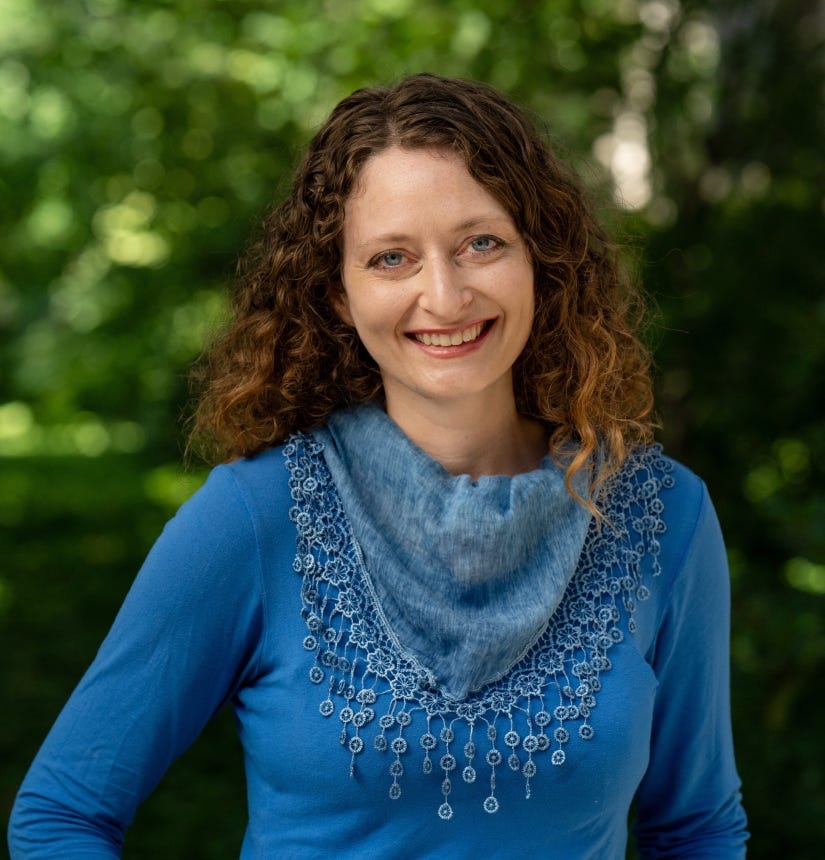
Professor Netta Barak-Corren is a legal scholar and cognitive scientist, focusing on empirical and behavioral analysis of constitutional and public law, with a particular interest in conflicts of rights and the interaction between law and religion and law and social norms.
She received her first degrees in Law and Cognitive Science from the Hebrew University (Valedictorian and three-time recipient of the Albert Einstein and Rector awards). She clerked for the Chief Justice of the Israeli Supreme Court, Hon. Dorit Beinish, and pursued doctoral studies at Harvard, graduating in 2016.
Professor Barak-Corren is currently a Professor of Law at the Hebrew University of Jerusalem and the Academic Director of the Center for the Study of Multiculturalism and Diversity at the Hebrew University. She is also an elected member of the Federmann Center for the Study of Rationality at the Hebrew University of Jerusalem. During 2020-2022 she was also a Nootbaar Religious Freedom Fellow at Pepperdine University School of Law.
As mentioned above, we’ve had her on the podcast twice. You can listen to her episode on Israel at the Hague here and the episode on a Constituent Assembly for Israel here.
The link at the top of this posting will take you to the full recording of our conversation; below you will find a transcript for those who prefer to read.
So, Professor Barak Corren, thank you so much for coming back on the podcast. We've had you on a number of times because of your expertise in a multitude of areas. You came and you taught us about the whole judicial reform issue back in the day, we talked about the need for a constituent assembly, and then we talked about the International Court of Justice when there was some possibility that it would rule against Israel, and you briefed us on that and explained.
You're now involved in a whole new or additional project which has to do with a very, very worrisome development of this war far from Israel and far from the battlefield, but one that could have a tremendous impact on Israel and Israelis, which is the international academic and other sorts of boycott of Israelis. And I know you've taken and are taking a lead role in trying to fight it. So, why don't we just start from the very beginning. Explain to us what's happening. Explain to us what the potential danger to Israel and Israelis is, how serious the problem is, what can be done, the whole story.
All right. Thank you very much, and it's good to be back on the podcast. So, in the past few months, I've been asked by the leadership of my university, the Hebrew University of Jerusalem, to take the role of combating the BDS movement in academia. So, already as a start, what I'm going to talk about is the implications and the transformation and how this movement looks today in the academia, although, as you briefly noted, it is also apparent and worrisome in other areas of Israeli life.
And what we have been experiencing over the past, I would say, three to four weeks has transformed from what I can define as a trickle in the months immediately after October 7th to a real flood in the past few weeks. And it seems to be directly related to the spread of the encampments across United States universities and the contagion or the sort of copying movement, the inspiring movement that that created in other parts of the world, primarily Europe, but also elsewhere, even in Asia. And so, what we have seen on our end is a massive, massive flow of universities, primarily in Europe, where the leadership has had to deal with immense pressures, primarily from students, and sometimes from students and faculty, to cut academic ties with Israel. I want to say that this has also been present in the American movement. So, American college students also called their universities to cut academic ties with Israel. But the European presidents and rectors seem to be much more inclined and willing to do so, so far. Though we do recognize worrying trends, what one might worry could be a slippery slope also in the United States.
Now, when you say that people are severing academic ties with Israel, what does that actually mean and how does that affect Israelis?
All right. So let me take a step back and explain how, when we say boycott, what forms it takes in reality. So when I said, when I used the metaphor of trickle before, from October 7th onwards until about a month ago, that primarily took the form of individual academics, for example, professors who were approached by their Israeli counterparts, for example, to provide evaluation letters or as invitees to conferences and responded, no, we're not going to take this invitation, or we're not going to collaborate, or we're not going to cooperate with this academic request because we're boycotting Israel because of the war in Gaza.
There were also cases of what I call disinvitations, where Israeli academics were disinvited from events they were invited to before because of the war and because of them being Israelis, not because of their stance towards the war or for anything related to their actual work. These are individual cases. But what we have seen in the past month is a really growing trend of institutional cases of boycott. That means that an entire university, for example, last week, the Free University of Brussels, or the week before that, Leiden University in the Netherlands, or Helsinki University in Finland, these are all examples from the past 10 days or so, state that they're ending unilaterally their academic ties with Israeli universities because of the war under the very dubious argument that the university are somehow how responsible, related, complicit in what they argue to be human rights violations.
This has been done without any proof or evidence of whatever sort, but it has immediate effect on Israeli universities, either because exchange students’ programs are canceled unilaterally, and Israeli students and international students are barred from going to exchange programs where they already have plans to, or because it impacts international collaborations. And let me say, where the boycott movements have been in the past 20 years, mostly growing popularity in the humanities and in some areas of the social sciences, these decisions at the institutional level are implicating and having an effect on everyone. So many times, hard science collaborations involve consortium of, say, 12 universities. Hebrew University of Jerusalem is part of them, often funded by Horizon Europe. When the European partner says, we’re now cutting ties with Israeli universities, that also means that they're cutting the project, or at least cutting themselves out of the project, which can implicate or have an effect on the viability of the entire project for all universities, including those that do not boycott Israel. So, there are institutional forms of the boycott, there are individual forms of the boycott. All forms of the boycott are obviously very worrying and antithetical to the nature of academic endeavor.
But the institutional parts are having really wide-ranging implications. And as I said, we're currently under a real flood in those. And I know many of the audience of the podcast are sitting out in many places in the world, many of them also in the United States, let me just say that even though we have rarely seen this outside of Europe, we have seen the same pressures levied against American universities. Many people have heard about the example of Sanoma University in California, where the President of the university agreed to cut academic ties with Israeli universities and then was put on suspension the day after. But right now, as we speak, UC Davis is under a lot of pressure to suspend its program with a veterinary school of the Hebrew University of Jerusalem. And the protestors are collecting signatures, calling on the campus and the University of California, to cut the program entirely. Again, under a dubious theory that any collaboration with the Hebrew University of Jerusalem is collaboration with the massacre of Palestinians in Gaza. And we see this growing around the United States as well in the form of motions by faculty members for the senate, for the faculty to vote on this and so on.
So, explain to us now, let's say the Veterinary School of UC Davis cuts its ties with an Israeli university. What are the implications of that? How does that affect the university? How does that affect Israelis? And are we going to get to a stage where Israelis might have to make a choice between having the academic career that has always been core to their professional dreams, doing the research, etc., etc., and living in Israel? Are we going to get there? Is that the choice that Israeli academics are going to have to make? But before we get to that, let's just talk about when a veterinary school pulls out of an arrangement with Israel, what does that actually affect? Is it research? Is it students? What's the story there?
So first, with respect to your, I think it was your latter question, I really hope not. So, I really hope that Israeli scientists will not have to face this choice, and this is what me and others are working on. And we have several ways to approach it, and I will talk about that in a second.
The implications of these various acts of cutting ties vary with respect to the specific ties involved. So far, we have seen unilateral cancelations of student exchanges. Specifically, I'm talking from the perspective of the Hebrew University of Jerusalem, but other universities are facing these effects as well. But potentially, everybody has different agreements with different universities, so this can come from different universities. We have seen two unilateral cancelations of student exchanges, and we also have seen a massive sort of blanket boycott that impact both student exchanges and individual ties between research cultures and international collaborations. For example, the consortium that I described before, where 12 or sometimes even 50 universities are involved in Hebrew University of Jerusalem, or Weizmann Institute is one of them, but now the European partner pulls off, and this poses really huge questions for the possibility to continue with the collaboration for everyone.
So, the nature of the effect that just follows the nature of the relationship, we have seen universities that has been, unfortunately, frequent telling their researchers, you are not allowed to start a new collaboration with an Israeli partner. So, you two were thinking about starting a grant together, applying for a grant together, starting a collaboration together, this is not allowed. And the European partners are writing their Israeli counterparts and saying, I'm sorry, I wanted to work with you, but my university is not allowing me. Think about the implications of that for academic freedom. And this is a cornerstone of academic freedom to decide what to work on and with whom. And this is now curtailed by universities that either explicitly or sufficiently produce this chilling effect on the researchers. So, asking them to not write to them from their Hebrew University email, but from their primary email.
You think about the sequence of thoughts that lead a professor, a senior professor in a university, to ask that from their Israeli counterpart that means that they are so afraid of their university spying on their relationships, that even the emails, they're not, they don't have confidence in their email communication. We have seen contracts that were either canceled or not coming to fruition because of, we can't enter a contractual relationship with you now.
So, we've seen all of these forms. And let me say something else that is also very worrisome. We have also seen something that you can't really define it as anything other than bullying against Israeli scientists in conferences, where participants are circulating conference-wide statements demanding that Israeli's who will be disinvited from the conference and trying to put pressure on the organizers to shun out Israeli scholars. And sometimes the organizers cave in, sometimes they're courageous enough. And then they typically are subject to a barrage of various kinds of insults and personal costs for their standing by the side of their Israeli counterparts.
So, all of this is going on right now. And some of this is also... most of this is going on in Europe. Some of this is going on in Canada. Some of this is going on in the United States. Some of this goes on even in Singapore or places like that. So, it really explodes.
I want to talk a little bit about what we do and how, in previous episodes where I've been here, where you were generous enough to invite me, you've sometimes asked me, what can people who listen to this podcast do? And I often didn't have a good answer, but now I do. So, I want to leave a little bit of room for that as well. So first, let's talk about what we do. Here, I also want to turn the tone a little bit on the optimistic side, if I can, because it's not all bad, and we do have successes, all right?
So, the first thing that we do, our analysis of the situation is that in many, many, many places, this is like a game being played with only one party on the field or a trial where only one party is present. So, the BDS movement has been super successful in organizing and in spreading lots of misinformation on Israeli universities that have absolutely no factual basis. And so, there are these misconceptions being spread that Israeli universities are apartheid universities, that they're segregationists, that they don't admit Arab students, that they don't have Arab faculty, that they somehow explicitly collaborate with all kinds of atrocities. There is nothing that can be further from the truth. And a lot of what we do is to spread good information. So, what our universities are actually like, what is the social makeup of our universities, what kind of courses we offer, what work we do to further peaceful coexistence and creative solutions for the conflict. And I can only speak for the Hebrew University, but our student body is super diverse. 16% of our students are our Palestinians. Half of them from East Jerusalem. We have invested and still invest a ton of resources in recruiting them, in training them, in providing the language resources for studying in a internationally top university, which is the Hebrew University of Jerusalem, complementing their pre-existent education with language classes in both Hebrew and English. This is just a tip of the iceberg. We have so much that we do, so many centers of work on peace building and multiculturalism, and human rights, and so many offerings. And so not many people know these things at all. And when they hear those things, and when they get this information, this often lead to a pause. And you know what? We even got some formal apologies from presidents of universities when we were communicating this information.
So, part one is simply to communicate information, and we do that in several ways. We communicate with heads of universities. We communicate with communities, with faculty. To do this effectively, and this is the number one item that people can be helpful with, we need information that something is boiling somewhere. We need to know that there is a movement to boycott Israel that is actually gaining momentum somewhere. And then we can preempt it by helping to dispel all of those lies in advance. And there's so many lies. I just gave a few examples, but there's lots. So that's the number one item where people can be helpful just by reporting, by bringing it to our attention, and by then helping to circulate this information to all kinds of people who could be influential and impacted by the actual truth.
And then, in addition, going back to this really important insight, that this is currently being held as a one-sided game where there's no other side on the field, and the BDS movement pressures universities, but there's no counter pressure to not boycott and even to expand ties with Israeli universities. Because frankly, everybody who wants to find a serious resolution to this bloody long-standing conflict should search for it. One of the primary places where people should search for it is in Israeli universities, and of course, other places of high learning and institutions, including Palestinian universities. But Israeli universities in and of themselves are home for both Israeli scientists and Palestinian scientists and have been growing a massive body of knowledge on conflict resolution for decades and have been contributing actively to previous attempts at finding resolution to these and other bloody conflicts.
So, the pressure should really be on the reverse side, not in favor of cutting ties, but in favor of getting more in ties. So, investing more in sending students to Israel, investing more in creating academic collaborations and this pressure, we don't see enough of it on university campuses. So, if you are listening to this podcast and you are somehow affiliated with the university, this is a pressure, this the kind of letter that one can send to its leadership, one can try and collect or garner support around in order to really do something good for the resolution of the conflict and also counteract those BDS movements.
And the third thing that I would do, I want to take us a little bit like one step aside. There's often this talk about today in academia, often in many other places, asking senior people organizing conferences, panels, all kinds of events to notice the diversity of the people in the panel, to make sure that there are enough voices from, for and against, and there are enough women or people of various races. I mean, this is a very common academic talk. Right now, because of the both explicit and implicit attempts to boycott Israeli scientists, I think it's very important for people to have this awareness in mind with respect to Israeli guests. So, to make sure that both sides of the discussion or enough sides of discussion, there are more than two, are represented and that the discussion is not one-sided. And to make sure, even in areas that do not have anything to do with the conflict, that to think actively about whether an Israeli scientist would be a good guest here, not because of his or her Israeli identity, but because they're relevant, and to make those offers, because it's very likely that the pressures are going the other direction. We have heard people say to, for example, to Israeli potential postdocs that this is not a good timing for them to come to the lab because people might shun them. And so, it's better not to save this trouble.
So, Israelis are discriminated against in various places right now. So, to counteract that by actively thinking each person within their own domain of power, counteracting this trend, and thinking about whether there is a relevant Israeli speaker to give the stage to. This, I think, is another important matter.
And the last thing I'll say, because we don't have a lot of time to discuss, it's fascinating in itself, I'm currently leading the legal effort on behalf of all Israeli universities as part of this movement. Lawsuits are an effective and impactful tool in combating all forms of discrimination. Many, many countries, both in Europe, the United States, Canada, have anti-discrimination laws that prohibit discrimination on the basis of various crimes, including religion and national origin. Much of what we're seeing is national origin discrimination, and arguably also religious discrimination. And some countries have anti-BDS legislation, many states in the United States, and also the United States itself has a federal law to this effect. So, this is also something that people should keep in mind. Sometimes these things are actionable, and lawsuits can be initiated in the various places where people are listening. If there is a clear and outrageous case of discrimination this is something that can potentially can be brought to court or as a compliant to the relevant bodies. So, this is also another avenue where people can be helpful.
So, you were saying before that people can be helpful in giving you information or alerting you to potentially brewing discriminatory plans, or this inviting somebody from a conference or whatever. How do people actually get the information to a central collection place where you and your colleagues can actually work on it?
That's an excellent question. So, people can reach out to me. So, we are collecting it. We do have databases. We are collecting information. The Association of Israeli Universities have decided on creating a unified task force. But I can also to this effect, I can also say, and I'm saying this is unfortunate, it's both natural and unfortunate, all right? So as one can imagine thinking about their own country, not all university presidents think the same. They're independent institutions. It can be hard to collaborate even on something like this because they have different attitudes about the right strategy. And they also face different challenges because different universities have different agreements with various universities around the in the world, and what fits Hebrew University does not necessarily fit Tel Aviv University or Weizmann or Bar Ilan. So, it's not that easy to coordinate. And also, Israeli universities are immensely really flatted now under lots of... There's both this and other issues, and so it's slow. But each university has Vice President for international academic collaborations. This is public information. It's on universities' websites so you can look and see who that person is and you can write them an email and they will take care of that and if it’s related to Hebrew University they can write to me.
Okay, I want to end with just go back a bit and ask you one last question. This is inordinately both depressing and alarming, but also super helpful to make it clear to people that we can actually write back here, which is very important. You said before that there's a tremendous amount of lying out there and if people find out how heterogeneous Israeli universities really are and how much Hebrew University really invests in trying to recruit Arab students and giving them the catch-up that they need in terms of Hebrew and all those kinds of issues. So, your sense is that a lot of these places in Europe that are making these decisions, it's actually based on what they think to be the truth, as opposed to simply hiding behind this as a way of being anti-Israel because that's their politics. How much of this do you think is really data-based, and even in their mind, if it's wrong data, and how much of it is just politics masquerading as data?
I think that's a really excellent question. Let me sort of break it down to circles or groups that are involved or implicated in this. I think the hardcore of the BDS movement, this is just pretext. All of this is pretext. The actual goal is to isolate Israeli academia, which they have rightfully identified as one of the main engines of growth and prosperity in Israel and to bring to its demise. For this hardcore of the BDS movement, whatever they do, they do deliberately. This is all intentional falsifications. You can really see that in various ways. But around those, I would say, are two very important groups or circles that are each different. One of them, and I would think this is the mass and maybe the large majority of people who are simply, they just don't have information. They don't feel as strongly, and they don't have the ideological fever of the BDS movement, but they don't know anything. They don't really know anything about Israel. And so, if it's a game played with only one party on the field, they're just easy to affect. You can tell them all kinds of lies, and you can sound persuasive, and many people don't bother, and that's true with all areas of politics and knowledge, by the way, many people don't bother to check.
So, to have facts on the table and to create some counter effort to the BDS movement of falsifications and lies is, I think, important as it affects those larger circles that are just ignorant about the conflict, about the history, and specifically about Israeli universities, and could be persuaded with the facts. And not just with the facts, but just like, one of the absurdities of all of this is that they're doing this in the name of progressive values. And it's absurd and ironical that they're shunning the very institutions that actually work towards the advancements of these liberal humanist values. So, this cognitive dissonance becomes very clear when you actually learn, it's not just the facts themselves, but how they implicate the values involved that people care about and fight for.
And then the third group is the leadership of the universities that often, behind closed doors, tell us that they don't want to boycott or to cut ties, but they're under immense pressures. And they also need this information, and they perhaps need more than that. That's an important aspect of our legal effort. They need to be able to tell their constituencies that, this is a one-sided effort by constituencies, they need to be able to explain why they're not doing so, and having the information helps them provide them with ammunition to counter those claims and to tell those protestors, “You know, your heart might be in the right place, but your efforts are misguided.” And so, this is also important when you look at it from this perspective.
Okay, that is enormously instructive. Once again, I just want to thank you again for, we just talked about this idea a couple days ago and you explained to me that you’re very involved in this and we decided it was important for us to share this message with as many people as we possibly could. You're insanely busy with a whole array of things to say nothing of your regular, academic career. So, I'm very, very grateful to you for your time and for explaining this to us. We will try to get the word out as far and wide as we can. And look forward one day to having you on the podcast to talk about something really amazing and positive that's happened that we can all celebrate and learn from you about as well. But until then, thank you very much for all of your efforts. It's really always a pleasure to learn from you.
You’re welcome and great to be back here.
Music credits: Medieval poem by Rabbi Shlomo Ibn Gvirol. Melody and performance by Shaked Jehuda and Eyal Gesundheit. Production by Eyal Gesundheit. To view a video of their performance, see this YouTube:
Our Threads feed is danielgordis. We’ll start to use it more shortly.





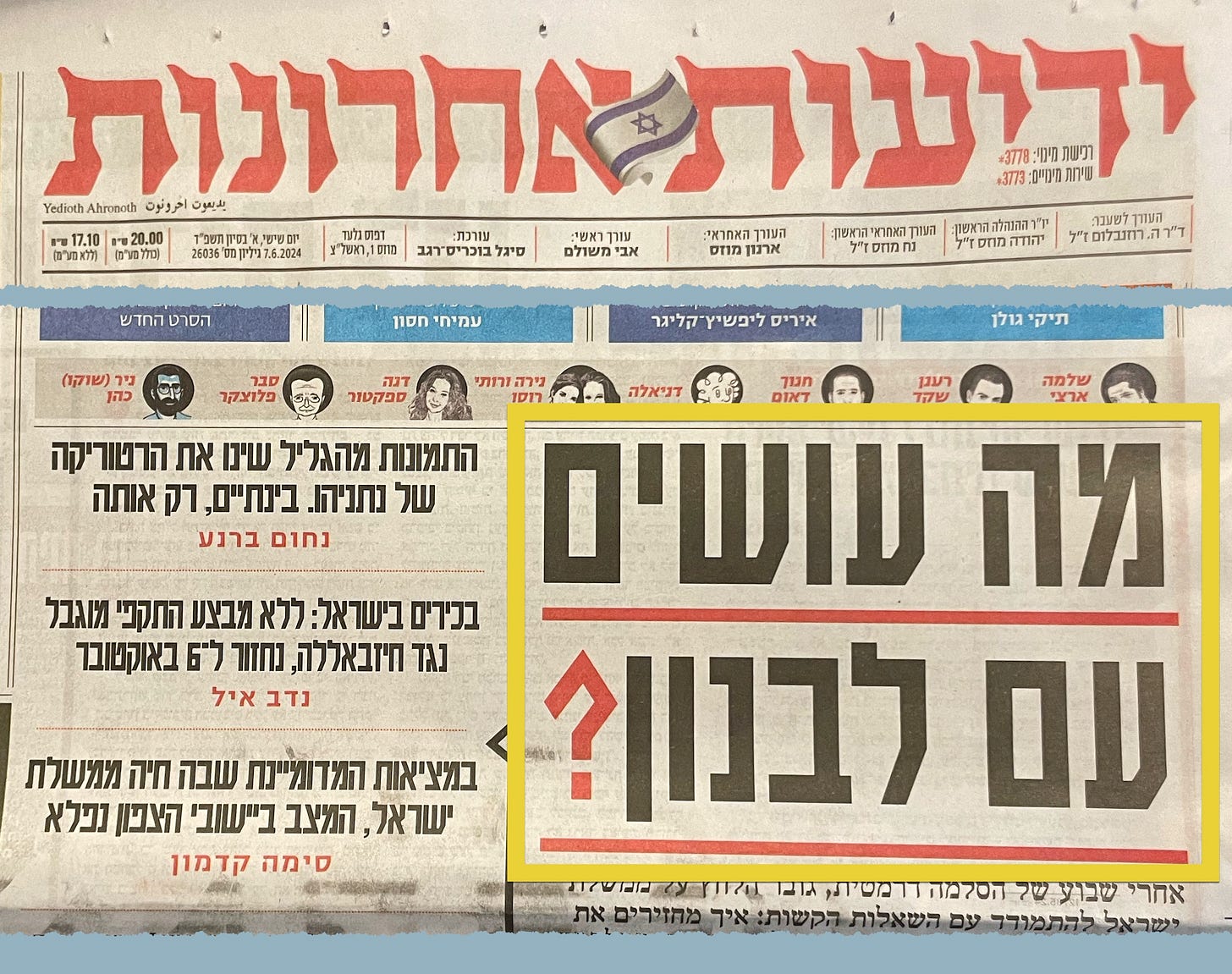
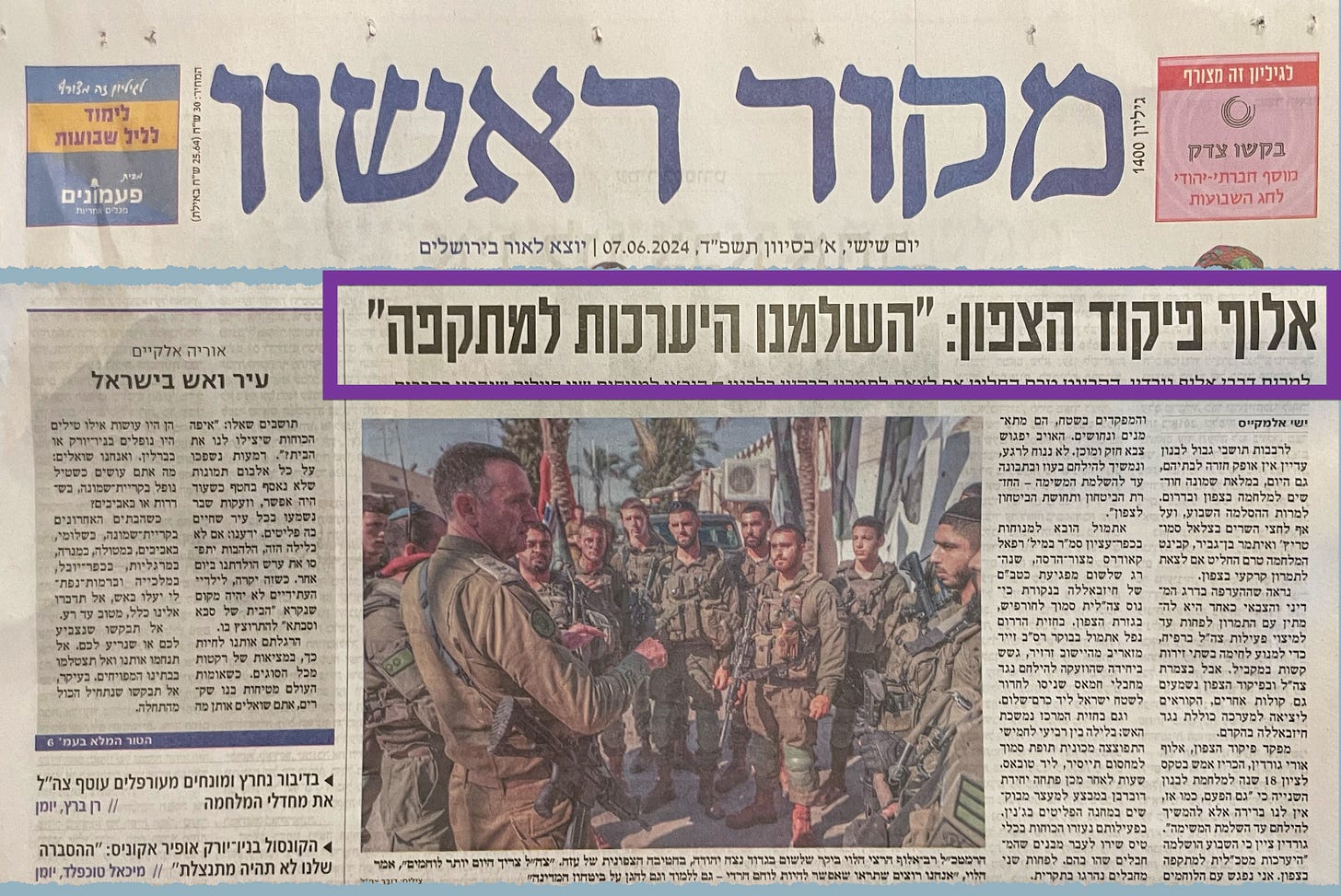

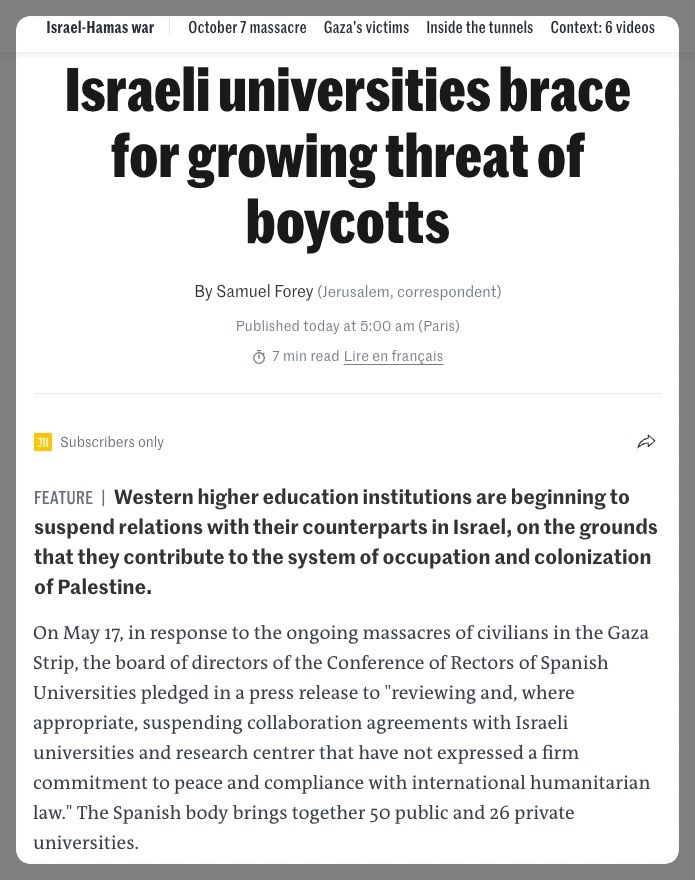





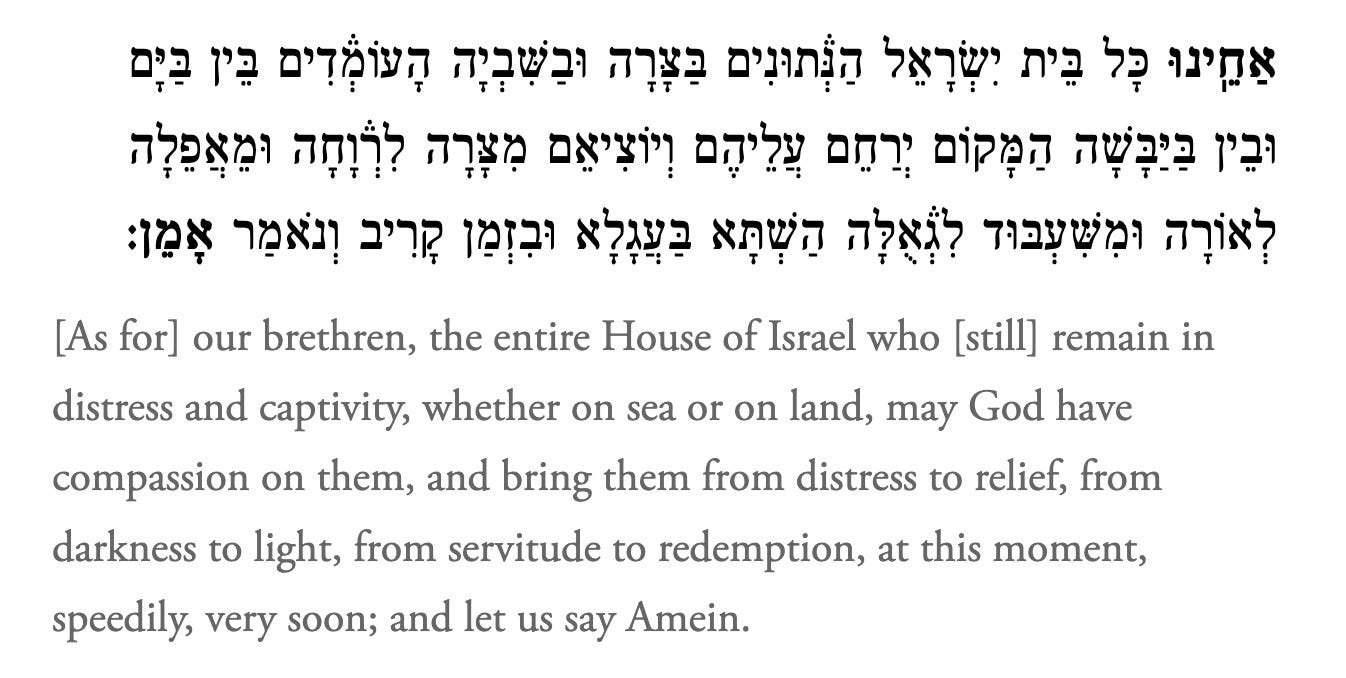












An international boycott of Israeli professors and universities is spreading, even in the US—but Israel is fighting back